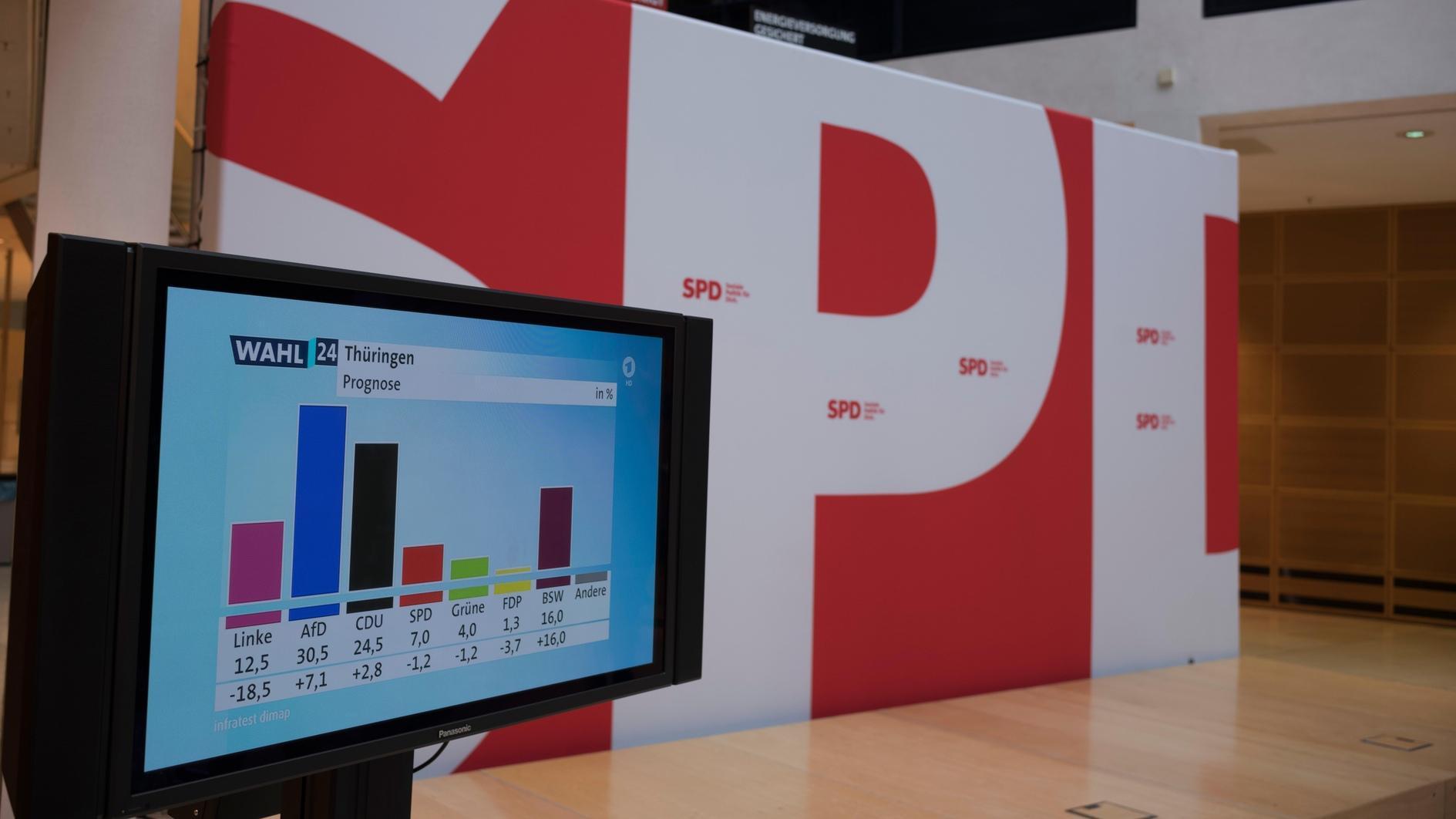
A screen shows first exit polls of the state election in Thuringia at the headquarters of Olaf Scholz's Social Democratic Party, SPD, in Berlin, Germany, Sunday, Sept. 1, 2024.
Germany's far-right AfD was Monday celebrating a landmark win in a regional vote, sending a shot across the bows of Chancellor Olaf Scholz's government a year ahead of national elections.
"We are ready and willing to talk to all parties," the Alternative for Germany (AfD) co-leader Tino Chrupalla said, warning there would be "no politics without the AfD."
The anti-immigration party topped the polls for the first time ever in the former East German state of Thuringia with around 33 percent of the vote and was headed for a close second place in neighboring Saxony.
But Sunday’s election winner will find it hard to put together a working majority in Thuringia, with other parties having repeatedly ruled out collaboration with the AfD.
The memory of the Nazis, who also scored an initial state election success in Thuringia, makes working with far-right parties highly taboo.
"Voters know that we do not form coalitions with the AfD," said Carsten Linnemann, the general secretary of the conservative CDU.
But Chrupalla called on other parties to drop their long-standing "firewall" against the AfD and instead respect the will of the voters.
'Reasonable government'
The CDU only narrowly edged out the AfD with 32 percent of the vote in Saxony and came second in Thuringia.
The conservatives still hold hopes of leading the next government in Thuringia, with its lead candidate Mario Voigt appealing for a "reasonable government" in a coalition led by the CDU.
The AfD's controversial local leader, Björn Höcke, meanwhile, declared that his party was the "people's party in Thuringia."
"We need change and change will only come with the AfD," he said, hailing the "historic result."
Höcke has often caused outrage with his outspoken statements and was fined twice this year for deliberately using a banned Nazi slogan.
Höcke's divisive personality has made the prospect of forming a coalition with any of the other parties doubly difficult.
Sahra Wagenknecht, who heads the far-left BSW, said her party "cannot work together" with Höcke and has long ruled out a coalition with the AfD.
BSW, formed earlier this year as a breakaway from the ex-communist Linke party, secured vote shares in the teens in both regional polls and is seen as a key building block in any coalition.
BSW, however, has serious differences with the more established parties, complicating negotiations, including a pro-Russia stance and opposition to the planned stationing of U.S. missiles in Germany.
'Alarming'
Political divisions and the complicated electoral math mean "forming a government will be difficult" after the two regional elections, said Marianne Kneuer, a professor of politics at the Dresden University of Technology.
Besides delivering an "alarming" win for the AfD, the election result was a "big slap for the entire government and Olaf Scholz," Kneuer said.
Scholz's Social Democrats recorded meek results, scoring around seven percent in Saxony and falling to six percent in Thuringia.
The chancellor's partners in a fractious coalition—the liberal FDP and the Greens—struggled even more.
The FDP fell below the five-percent threshold for seats in both elections, while in Saxony the Greens only scraped in.
The results were "nothing to celebrate," Social Democrats party chair Lars Klingbeil said, adding that the party had to be "better."
"We have to take care of people's everyday concerns," Klingbeil said.
The run-up to the elections was dominated by a bitter debate over immigration stirred up by a suspected Islamist knife attack a few days before the vote.
Opposition parties, including the AfD and the CDU, seized on the deadly stabbing in the western city of Solingen to criticize the government for its supposedly lax border regime.
The government has sought to respond to the alarm by announcing stricter knife controls and rules for migrants in Germany illegally.
Founded in 2013 as an anti-euro group, the AfD has morphed into an anti-immigration party and capitalized on discontent with the government to rise in the polls.